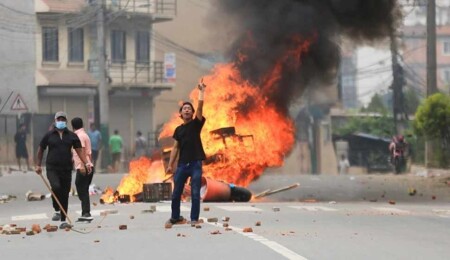Nepal Protests ‘Hijacked’, Gen Z Says As Army Patrols Streets

Nepal's army has deployed patrols on the streets of the capital Kathmandu, as the Himalayan nation reels from its worst unrest in decades.

Protests against corruption spiralled into arson and violence on Tuesday. The prime minister quit as politicians' homes were vandalised, and government buildings and parliament torched. Thirty people died and more than 1,000 were injured over two days of violence.
"Gen Z" groups spearheading the protests distanced themselves from the destruction, saying they had been "hijacked" by "opportunists".
On Wednesday, Kathmandu's airport reopened and the capital was relatively quiet as most residents obeyed a curfew, but smoke still rose from burning buildings.
The military, which is trying to control a spiralling situation, has invited the Gen Z protesters to engage in peace talks. Student leaders are consolidating a fresh list of demands, one of their representatives told the BBC.
Nationwide curfews are in place until Thursday morning and the army has warned violence and vandalism will be punished. Twenty-seven people have been arrested over violence and lootings and 31 firearms found, it added.
Officers are checking vehicle IDs at military checkpoints across the capital and urging people to stay at home. "No unnecessary travel" their voces blare through loudspeakers.
Still, some young people were out, carrying bin liners and wearing masks, cleaning up the damage caused by the protests.
"This corruption thing has been in Nepal since a very, very long time, and I think it is high time that the nation needs to change," said Ksang Lama, 14, who did not attend the protests. "I really hope that it can bring something positive to our country."
Parash Pratap Hamal, 24, did take part in the protests. He believes Nepal "needs independent political figures" and cites Kathmandu mayor Balendra Shah as someone who would make a good leader.
"People are hopeful now, after this revolution," said 36-year-old Rakesh Niraula who lives in eastern Nepal. "There is hope for better governance... We feel like it was a lesson for leaders to improve themselves so the country can have a bright future."
Even as they welcomed the prospect of change, some Nepalis told the BBC the violence and vandalism that marked the protests had taken them by surprise.
"Personally I believe this shouldn't have happened," Mr Niraula says.
Prabhat Paudel, an entrepreneur who lives in the city of Lalitpur, said he had been shocked by the burning of government buildings such as the Supreme Court "which is our own national wealth".
But many protesters are worried the movement has been co-opted by "infiltrators" - a claim echoed by the army.
"We are mainly in the process of controlling elements who are taking advantage of the situation to loot, set fires and cause various incidents," military spokesman Rajaram Basnet told the BBC.
A statement issued by protesters said the movement "was and remains non-violent and rooted in the principles of peaceful civic engagement". They added that they were volunteering on the ground to "responsibly manage" the situation, safeguard citizens and protect public property.
They also said no further protests were scheduled from Wednesday onwards, and called on the military and police to implement curfews as necessary.


Comments
Attention!
Sending all kinds of financial, legal, criminal, administrative responsibility content arising from illegal, threatening, disturbing, insulting and abusive, humiliating, humiliating, vulgar, obscene, immoral, damaging personal rights or similar content. It belongs to the Member / Members.